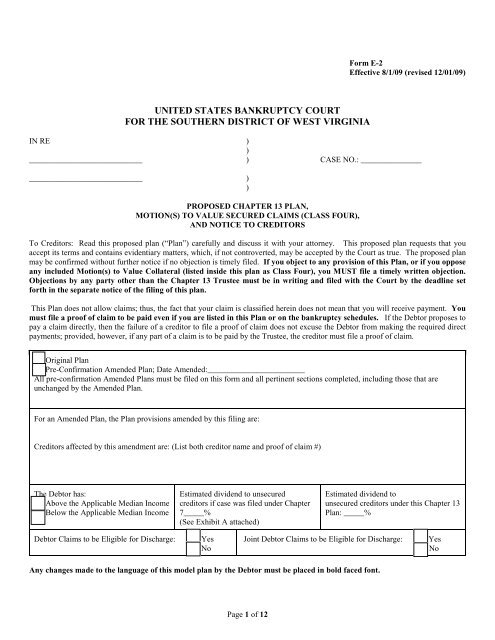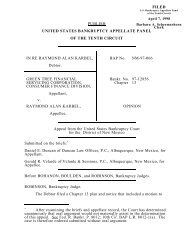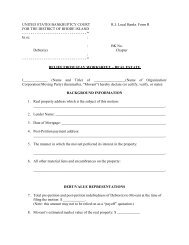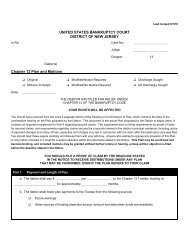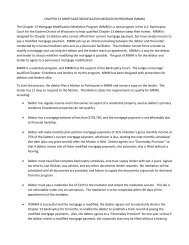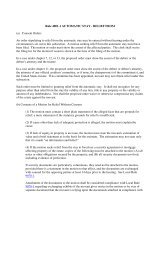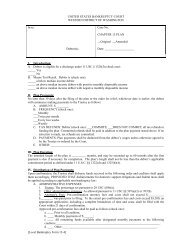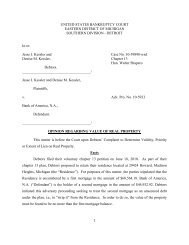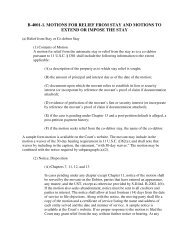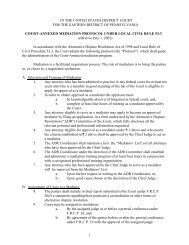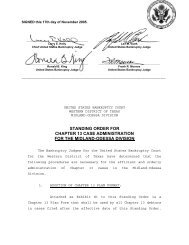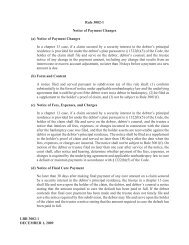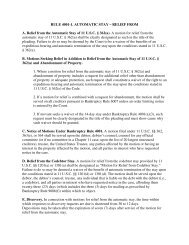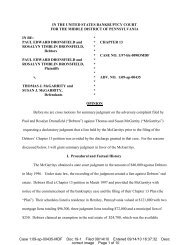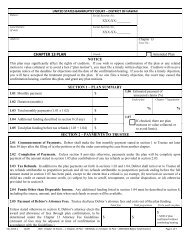Chapter 13 Plan - Bankruptcy Mortgage Project
Chapter 13 Plan - Bankruptcy Mortgage Project
Chapter 13 Plan - Bankruptcy Mortgage Project
You also want an ePaper? Increase the reach of your titles
YUMPU automatically turns print PDFs into web optimized ePapers that Google loves.
Form E-2<br />
Effective 8/1/09 (revised 12/01/09)<br />
UNITED STATES BANKRUPTCY COURT<br />
FOR THE SOUTHERN DISTRICT OF WEST VIRGINIA<br />
IN RE )<br />
)<br />
____________________________ ) CASE NO.: _______________<br />
____________________________ )<br />
)<br />
PROPOSED CHAPTER <strong>13</strong> PLAN,<br />
MOTION(S) TO VALUE SECURED CLAIMS (CLASS FOUR),<br />
AND NOTICE TO CREDITORS<br />
To Creditors: Read this proposed plan (“<strong>Plan</strong>”) carefully and discuss it with your attorney. This proposed plan requests that you<br />
accept its terms and contains evidentiary matters, which, if not controverted, may be accepted by the Court as true. The proposed plan<br />
may be confirmed without further notice if no objection is timely filed. If you object to any provision of this <strong>Plan</strong>, or if you oppose<br />
any included Motion(s) to Value Collateral (listed inside this plan as Class Four), you MUST file a timely written objection.<br />
Objections by any party other than the <strong>Chapter</strong> <strong>13</strong> Trustee must be in writing and filed with the Court by the deadline set<br />
forth in the separate notice of the filing of this plan.<br />
This <strong>Plan</strong> does not allow claims; thus, the fact that your claim is classified herein does not mean that you will receive payment. You<br />
must file a proof of claim to be paid even if you are listed in this <strong>Plan</strong> or on the bankruptcy schedules. If the Debtor proposes to<br />
pay a claim directly, then the failure of a creditor to file a proof of claim does not excuse the Debtor from making the required direct<br />
payments; provided, however, if any part of a claim is to be paid by the Trustee, the creditor must file a proof of claim.<br />
[ ] Original <strong>Plan</strong><br />
[ ] Pre-Confirmation Amended <strong>Plan</strong>; Date Amended:________________________<br />
All pre-confirmation Amended <strong>Plan</strong>s must be filed on this form and all pertinent sections completed, including those that are<br />
unchanged by the Amended <strong>Plan</strong>.<br />
For an Amended <strong>Plan</strong>, the <strong>Plan</strong> provisions amended by this filing are:<br />
Creditors affected by this amendment are: (List both creditor name and proof of claim #)<br />
The Debtor has:<br />
[ ] Above the Applicable Median Income<br />
[ ] Below the Applicable Median Income<br />
Estimated dividend to unsecured<br />
creditors if case was filed under <strong>Chapter</strong><br />
7_____%<br />
(See Exhibit A attached)<br />
Estimated dividend to<br />
unsecured creditors under this <strong>Chapter</strong> <strong>13</strong><br />
<strong>Plan</strong>: _____%<br />
Debtor Claims to be Eligible for Discharge:<br />
[ ] Yes<br />
[ ] No<br />
Joint Debtor Claims to be Eligible for Discharge:<br />
[ ] Yes<br />
[ ] No<br />
Any changes made to the language of this model plan by the Debtor must be placed in bold faced font.<br />
Page 1 of 12
I. <strong>Plan</strong> Payments and Length<br />
The Debtor will continue to make payments for the life of the <strong>Plan</strong>, regardless of whether the estimated dividend to unsecured<br />
creditors has been met. The Debtor shall pay $_________ over the life of the <strong>Plan</strong>, payable in [weekly, bi-weekly, or monthly]<br />
installments of $________ over a total period of _____ months to the Trustee. OR,<br />
The Debtor anticipates changes in income and expenses over the course of the <strong>Plan</strong> and proposes payments as follows:<br />
The Debtor shall make [weekly, bi-weekly, or monthly] installment payments to the Trustee in the amount of $_________ over a total<br />
period of _____ months to the Trustee.<br />
Then $_________ [ weekly, bi-weekly, or monthly] for a total period of ____________ months<br />
Then $_________ [ weekly, bi-weekly, or monthly] for a total period of ____________ months.<br />
The Schedule I net income listed for the Debtor is<br />
Less the Schedule J expenses claimed by the Debtor<br />
Equals the Debtor’s claimed disposable income based on Schedules I & J<br />
$_______<br />
$_______<br />
$_______<br />
If the Debtor has above median income, the Debtor listed disposable income on Line 59 of Form B22C (Statement of Current Monthly<br />
Income and Calculation of Commitment Period and Disposable Income) in the amount of $_________.<br />
The Debtor shall make <strong>Plan</strong> payments by:<br />
[ ] A wage withholding order:<br />
(Name of Debtor)________________________________________________________________________<br />
(Name of Employer)_____________________________________________________________________<br />
(Employer’s Address) ____________________________________________________________________<br />
_________________________ ____________________________________________________________<br />
(Employer’s Telephone) __________________________________________________________________<br />
(Amount to be withheld) $____________________________every month.<br />
(Name of Joint Debtor)___________________________________________________________________<br />
(Name of Employer)_____________________________________________________________________<br />
(Employer’s Address) ____________________________________________________________________<br />
______________________________________________________________________________________<br />
(Employer’s Telephone) __________________________________________________________________<br />
(Amount to be withheld) $____________________________every month.<br />
[ ] Direct payment by the Debtor. (Unless otherwise exempted from the wage withholding requirement, checking this box<br />
requires the Debtor to file a motion to the <strong>Bankruptcy</strong> Court explaining why a wage withholding order should not be<br />
entered.)<br />
In addition to the monthly <strong>Plan</strong> payments proposed by the Debtor, the following additional property is dedicated to pay claims against<br />
the Debtor: _________________________________________________________________________________________________<br />
___________________________________________________________________________________________________________<br />
(Specify property or indicate if none). Additional property increases the gross base of the <strong>Plan</strong>.<br />
TAX REFUNDS - Regarding the receipt of future tax refunds, the Debtor proposes to:<br />
[ ] Dedicate all amounts over $1500 from all tax refunds to increase the gross base on the proposed <strong>Chapter</strong> <strong>13</strong> <strong>Plan</strong>;<br />
OR<br />
[ ] Dedicate the entire amount of all tax refunds to increase the gross base on the proposed <strong>Chapter</strong> <strong>13</strong> <strong>Plan</strong>;<br />
[ ] Other. Please explain:_______________________________________________________________________________<br />
____________________________________________________________________________________________________<br />
The Debtor shall submit all tax refunds that are dedicated to the <strong>Plan</strong> to the Trustee within 30 days of receipt of the same.<br />
Page 2 of 12
EFFECTIVE DATE. <strong>Plan</strong> payments shall commence not later than 30 days after the filing of the petition or date of conversion from<br />
another chapter. The amount of the monthly <strong>Plan</strong> payment may be increased without notice at or before the confirmation hearing. The<br />
proposed <strong>Plan</strong> length runs from:<br />
[ ] The date that the first <strong>Plan</strong> payment is made pursuant to § <strong>13</strong>26(a)(1); or,<br />
[ ] The date of confirmation, with all pre-petition payments being dedicated to pay claims against the Debtor.<br />
ADEQUATE PROTECTION PAYMENTS. Unless otherwise ordered, if a secured creditor is being paid through the Trustee, then all<br />
§ <strong>13</strong>26(a)(1) adequate protection payments shall be made through the Trustee in the amount set forth in this proposed <strong>Plan</strong>. Payment<br />
shall be subject to the Trustee’s fee and shall be made in the ordinary course of the Trustee’s business. However, the Trustee is not<br />
obligated to make any pre-confirmation adequate protection payments to a secured creditor until that creditor files a proof of claim.<br />
II.<br />
III.<br />
<strong>Plan</strong> Analysis - Total Payments Provided For In the <strong>Plan</strong> (not including any amounts not paid through the Trustee)<br />
Class One<br />
$_________<br />
Class Two<br />
$__________<br />
Class Three<br />
$__________<br />
Class Four<br />
$__________<br />
Class Five<br />
$__________<br />
Class Six<br />
$__________<br />
Class Seven<br />
$__________<br />
Class Eight<br />
$__________<br />
Other<br />
$__________<br />
Total (should equal the total Debtor proposes to pay in Section I.)<br />
$__________<br />
Classification of Claims and Valuation of Secured Property<br />
Each holder of an allowed secured claim , which is paid during the life of the <strong>Plan</strong> and for which the collateral not surrendered, shall<br />
retain the lien securing the claim until the earlier of: (1) payment of the underlying debt as determined under non-bankruptcy law; or<br />
(2) discharge. Should this case be dismissed or converted before the <strong>Plan</strong> is completed, the lien securing an allowed secured claim<br />
shall be retained by the holder to the extent recognized by non-bankruptcy law.<br />
CLASS ONE - Allowed, Priority, Unsecured Claims Under § 507 of the <strong>Bankruptcy</strong> Code.<br />
(1) Trustee’s Fees. The Trustee will receive from all disbursements such amount as is approved by the Court for payment of fees and<br />
expenses. The Trustee’s fees are estimated to be 10% of each monthly disbursement. The Debtor has proposed a <strong>Plan</strong> of<br />
reorganization that pays a gross base of $______ over ___ months; thus the total estimated Trustee’s fee is $______. In the event that<br />
the Trustee’s fees are less than 10%, the additional funds collected by the Trustee shall be disbursed to unsecured creditors up to 100%<br />
of the allowed claim.<br />
(2) Attorney’s Fees. The Attorney for the Debtor will be paid a base fee of $________ plus 4% of <strong>Plan</strong> payments. The Attorney<br />
received $_______ from the Debtor pre-petition and the remainder of the base fee will be paid after confirmation of this <strong>Plan</strong> and<br />
concurrently with any secured debt payments and any domestic support obligation that is to be paid by the Trustee. However, funds<br />
are to be applied first to long term mortgage debts paid through the Trustee, second to equal monthly payments to other secured<br />
creditors, third to domestic support creditors, and only then to the attorney’s fees. Attorney’s fees will be paid over the life of the <strong>Plan</strong><br />
based on the <strong>Plan</strong> payments received by the Trustee. In the event that this <strong>Plan</strong> is not confirmed, the attorney may apply to the Court<br />
for compensation to the extent that the Trustee holds pre-confirmation funds paid by the Debtor. After confirmation of this <strong>Plan</strong>, the<br />
Debtor’s attorney must apply to the Court for any additional compensation.<br />
(3) Domestic Support Obligations.<br />
[ ] The Debtor has no domestic support obligations<br />
[ ] The name and address of the holder of any domestic support obligation as defined in 11 U.S.C.<br />
§ 101(14A) is as follows: (Do not disclose the names of minor children or confidential information - instead,<br />
inform the Trustee privately)<br />
Page 3 of 12
Payments on Domestic Support Obligations will be made as follows:<br />
Claim #<br />
Name of DSO Claimant and/or Agency<br />
with full mailing address of each<br />
Estimated Arrearage to be<br />
Paid in the <strong>Plan</strong> (enter -0-<br />
if none is to be paid<br />
through the <strong>Plan</strong>)<br />
Payment Amount for On-Going Monthly<br />
DSO obligations. Indicate if Post-Petition<br />
payments are to be made by the Trustee<br />
(“T”), or the Debtor (“D”)<br />
(4) Other Priority Claims as defined by 11 U.S.C. § 507<br />
Claim # Creditor Type of Priority Estimated Amount Owed<br />
Unless the holder of a Class One claim agrees to different treatment, the Debtor will pay all Class One claims in full, in<br />
deferred payments, provided a proof of claim has been filed, if applicable. The amount and timing of each monthly payment is<br />
subject to the discretion of the Trustee.<br />
CLASS TWO - Debts Secured Only by the Principal Residence of the Debtor. The property address of the principal residence of<br />
the Debtor is:_______________________________________________________________________________________________<br />
[ ] There are no Class Two claims;<br />
[ ] There are Class Two claims that are treated under the following three options:<br />
Option 1: Direct Pay. The Debtor is not in arrears on these mortgage debt(s) and will directly pay the mortgage holder its regular<br />
monthly payment.<br />
Claim<br />
#<br />
Creditor<br />
Monthly<br />
Contract<br />
Payment<br />
Amount<br />
Total Number of Payments Remaining (if less than <strong>Plan</strong> length)<br />
Page 4 of 12
Option 2: Cure of Arrearage and Maintenance of Payments.<br />
On Going <strong>Mortgage</strong> Payments: If a pre-petition arrearage on a mortgage exists, then payment on both the arrearage and nonarrearage<br />
debts must be made through the Trustee unless otherwise ordered by the Court. The pre-petition arrearage will be<br />
paid in the <strong>Plan</strong> at 0% interest unless otherwise ordered by the Court. The arrearage amount listed is an estimate and is subject to<br />
change based upon a Creditor’s timely filed and allowed secured claim. The monthly amount on the arrearage debt is to be<br />
determined by the Trustee.<br />
Treatment of On-Going Monthly Payments<br />
Claim<br />
#<br />
Lienholder<br />
Regular<br />
Monthly<br />
Payment<br />
Total Number of<br />
Payments<br />
Remaining (if less<br />
than <strong>Plan</strong> length)<br />
Total Paid in <strong>Plan</strong> Through<br />
Trustee<br />
Treatment of Arrearage on <strong>Mortgage</strong> claims.<br />
Claim<br />
#<br />
Lienholder<br />
Amount of Arrearage<br />
Option 3: Other. The Debtor proposes the following treatment for Class Two claims:<br />
____________________________________________________________________________________________________________<br />
____________________________________________________________________________________________________________<br />
Unless a Class Two debt is paid in full in the <strong>Plan</strong>, Class Two claims (home mortgages) are to be paid as long term debts pursuant to<br />
and are excepted from discharge pursuant to § <strong>13</strong>28(a)(1).<br />
Notification of Payment Changes for Class Two Claims Being Paid through the Trustee<br />
In the event of any change in the amount of the monthly mortgage payments pursuant to the terms of the mortgage agreement, the<br />
creditor shall file with the Clerk, and serve upon the Debtor and Debtor’s counsel, a Notice of Payment Change. Upon the filing of a<br />
Notice of Payment Change, the Trustee will change the monthly payment amount. In the event a Notice of Payment Change is filed,<br />
the Trustee shall be responsible to submit to the Court an amended wage withholding order and to notify the Debtor and Debtor’s<br />
counsel in writing of the change in the <strong>Plan</strong> payment. In the event a payment change affects the rights of any other creditor, a preconfirmation<br />
amended <strong>Plan</strong> or motion to modify confirmed <strong>Plan</strong> must be filed.<br />
Page 5 of 12
CLASS THREE - Oversecured Claims and Secured Claims Not Subject to Valuation Under 11 U.S.C. § 506 (creditor claims<br />
that are secured by a purchase money security interest in a motor vehicle acquired for the personal use of the Debtor within 910 days<br />
preceding the filing date of the petition or any other personal property collateral acquired within one year preceding the filing date of<br />
the petition) and Over-Secured Claims.<br />
[ ] There are no Class Three claims;<br />
[ ] There are Class Three claims that are treated under the following four options:<br />
Option 1: Direct Payment. The Debtor is not in arrears on these Class Three debt(s) and will directly pay the Class Three creditor its<br />
regular monthly payment.<br />
Claim<br />
#<br />
Creditor Collateral Monthly<br />
Contract<br />
Payment<br />
Amount<br />
Total Number of Payments Remaining<br />
(if less than <strong>Plan</strong> length)<br />
Option 2: Cure of Arrearage and Maintenance of Payments. If this option is used, both the cure of the arrearage and the on-going<br />
contractual payments must be made through the Trustee, unless otherwise ordered by the Court.<br />
Treatment of On-Going Monthly Payments<br />
Claim # Lienholder Collateral Total<br />
Due at<br />
Filing<br />
Interest<br />
Rate<br />
Monthly<br />
Contract<br />
Payment<br />
Amount<br />
Number of<br />
Payments<br />
Remaining<br />
Total Paid<br />
in <strong>Plan</strong><br />
Through<br />
Trustee<br />
Treatment of Arrearage on Class Three claims. The pre-petition arrearage must be paid through the Trustee and will be paid in the<br />
<strong>Plan</strong> at 0% interest unless otherwise ordered by the Court. The arrearage amount listed is an estimate and is subject to change based<br />
upon a Creditor’s timely filed and allowed secured claim. The monthly payment on the arrearage will be determined by the Trustee.<br />
Claim # Lienholder Collateral Amount of Arrearage<br />
Page 6 of 12
Option 3: Modification of Creditor’s Claim Except as Provided in 11 U.S.C. § 506. Claims that are modified in a <strong>Chapter</strong> <strong>13</strong> <strong>Plan</strong><br />
must be paid through the <strong>Chapter</strong> <strong>13</strong> Trustee. Both the arrearage amount and the remaining principal balance are paid at the prime<br />
rate in effect on the petition date, plus 2 percentage points, unless a different rate is stated. The total amount to be paid in the <strong>Plan</strong><br />
may be determined by the following formula: Interest = Principal (rate of interest x term).<br />
Claim # Creditor Collateral Total Owed<br />
(including<br />
arrearage)<br />
Interest<br />
Rate<br />
Number of<br />
Proposed <strong>Plan</strong><br />
Payments<br />
Total Paid in<br />
<strong>Plan</strong> through<br />
Trustee<br />
Option 4: Other. The Debtor proposes the following treatment of Class Three claims:<br />
____________________________________________________________________________________________________________<br />
____________________________________________________________________________________________________________<br />
CLASS FOUR - Motions to Value Secured Claims.<br />
[ ] There are no Class Four claims.<br />
[ ] There are Class Four claims that are treated as follows:<br />
The Debtor moves to value the collateral indicated below. The Trustee shall pay allowed secured claims the value of the collateral as<br />
indicated, in full, over the duration of the <strong>Plan</strong>. The Trustee will pay interest on the secured portion of the claim at the prime rate in<br />
effect on the petition date, plus 2 percentage points, unless a different rate is stated. Total interest required to be paid over the life of<br />
the <strong>Plan</strong> may be determined by the following formula: Interest = Principal (rate of interest x term). The actual amount and timing of<br />
the payment(s) on the secured portion of the claim are subject to the discretion of the Trustee. The amount of the creditor’s claim in<br />
excess of the Debtor’s valuation for the collateral shall be treated in the Class Six as an unsecured claim if the creditor timely files a<br />
proof of claim. A claim with collateral listed at NO VALUE in the Debtor’s Valuation column below will be treated as an unsecured<br />
claim and the lien is avoided pursuant to 11 U.S.C. § 506.<br />
Claim # Creditor Collateral Amount<br />
Owed<br />
Debtor’s<br />
Valuation<br />
Interest<br />
Rate<br />
Total Paid in <strong>Plan</strong><br />
NOTICE OF HEARING TO VALUE SECURED PROPERTY<br />
Notice is given pursuant to § 506(a) that the Debtor moves to value the secured property listed in Class Four of this <strong>Plan</strong>. The<br />
Debtor is the owner of the property serving as collateral, is aware of its condition, and believes that its value is as set forth<br />
above. A § 506 valuation hearing will be scheduled for the date and time set for the confirmation of the <strong>Plan</strong>. Objections to<br />
motions to value must be filed in writing with the Court and must be filed by the deadline set for filing objections to<br />
confirmation.<br />
Page 7 of 12
CAUTION<br />
At the Debtor’s option, the Debtor may file a separate motion to value, in which case the affected creditor will be sent either a<br />
notice setting the motion for hearing or a default notice allowing twenty-one (21) days to file an objection otherwise the<br />
Debtor’s motion may be granted by the Court. If the Debtor files a separate motion to value, the Court will adjudicate the<br />
issue based on the separately filed motion and not pursuant to the terms of this <strong>Plan</strong>. In the event the Court has granted the<br />
Debtor’s separate motion to value, affected creditors may not object to confirmation of the <strong>Plan</strong> on the grounds of valuation.<br />
In the event a separate motion to value is filed listing collateral at a lower value than originally set forth in the <strong>Plan</strong>, and the<br />
Trustee has made adequate protection payments pursuant to the <strong>Plan</strong>, the creditor may retain any funds paid by the Trustee<br />
before entry of an order of valuation.<br />
CLASS FIVE - Secured Collateral to be Surrendered or Sold<br />
[ ] There are no Class Five claims.<br />
[ ] There are Class Five claims that are treated as follows:<br />
The Debtor proposes to surrender or sell the following collateral:<br />
Claim # Creditor Collateral Amount<br />
Owed<br />
Debtor’s<br />
Valuation of<br />
the Collateral<br />
Indicate if<br />
Surrendered<br />
or to be Sold<br />
Time to<br />
complete sale,<br />
if applicable<br />
For property the Debtor proposes to sell, a separate Motion and proposed Order must be filed which provide the details of the sale.<br />
Court approval also must be obtained for the hire and use of a professional to sell property. After the payment of secured debts and the<br />
costs of sale, all net proceeds shall be paid to the Trustee for distribution. Property to be sold by the Debtor that is not sold in the<br />
applicable time period will be surrendered to the creditor unless the Trustee requests additional time, or unless the Debtor modifies the<br />
<strong>Plan</strong> to retain the collateral and cure existing defaults. A secured creditor entitled to a deficiency claim must file that claim within<br />
90 days of the date that the real or personal property is surrendered by the Debtor, or within 30 days of a sale that is<br />
conducted by the Debtor. After the payment of secured debts and the costs of sale, a report accounting for the sale shall be made and<br />
all net proceeds shall be paid to the Trustee for distribution.<br />
CLASS SIX - Timely Filed and Allowed Non-Priority Unsecured Claims<br />
Class Six claims will be paid pro rata. The Debtor estimates that Class Six claims will receive ____% of their claims. Payment of any<br />
dividend will depend on the amount of secured and priority claims allowed and the total amount of all allowed unsecured claims. No<br />
payment will be made until unsecured priority claims are paid in full, and no payment will be made on Scheduled claims unless a<br />
proof of claim is filed.<br />
The value as of the effective date of the <strong>Plan</strong> of property to be distributed in the <strong>Plan</strong> on account of each allowed unsecured claim is<br />
not less than the amount that would be paid on such claim if the estate of the Debtor was liquidated in <strong>Chapter</strong> 7 of the <strong>Bankruptcy</strong><br />
Code on that date. The percentage distribution to general unsecured creditors in <strong>Chapter</strong> 7 is estimated to be ____%, as shown on<br />
Exhibit A attached hereto.<br />
Page 8 of 12
CLASS SEVEN - Executory Contracts / Unexpired Leases<br />
The following executory contracts and/or leases are held by the Debtor. The treatment of each lease/contract is set forth below. The<br />
Debtor shall surrender any property covered by rejected executory contracts or leases to the affected creditor no later than the date this<br />
<strong>Plan</strong> is confirmed.<br />
Claim<br />
#<br />
Creditor<br />
Indicate if Assumed or<br />
Rejected and identify<br />
the item leased<br />
Monthly payment -Indicate<br />
if payments will be made<br />
in the <strong>Plan</strong> (Y/N)<br />
Arrearage<br />
amount<br />
Total Paid in <strong>Plan</strong><br />
through Trustee<br />
CLASS EIGHT - Post-Petition Claims Under <strong>Bankruptcy</strong> Code § <strong>13</strong>05<br />
Unless a timely objection is filed, post-petition claims allowed under § <strong>13</strong>05 shall be paid, in full, in equal monthly installments.<br />
Payments shall commence no later than 30 days after the filing of the claim, and conclude on or before the date of the last payment in<br />
the <strong>Plan</strong>, unless otherwise ordered by the Court.<br />
Other <strong>Plan</strong> Provisions<br />
A. Co-Debtor Claims<br />
The following claims for consumer debts on which another individual is liable with the Debtor are separately classified. Unless<br />
otherwise indicated co-debtor claims are to be paid in full.<br />
Claim # Creditor Co-Debtor Interest<br />
Rate<br />
Monthly Payment /<br />
Number of Months<br />
Paid by the<br />
Trustee (“T”) or<br />
the Debtor (“D”)<br />
Total Paid in<br />
<strong>Plan</strong> through<br />
Trustee<br />
Page 9 of 12
B. Student Loans<br />
The following claims are non-dischargeable student loans and will be treated as follows:<br />
Claim # Creditor Amount<br />
Owed<br />
Interest<br />
Rate<br />
Choose An Option:<br />
1. Debtor to pay directly outside the <strong>Plan</strong>;<br />
2. Pay pro rata through the <strong>Plan</strong> as a Class<br />
Six creditor; or<br />
3. Other (Explain basis for treatment below.)<br />
Total Paid<br />
in <strong>Plan</strong><br />
C. Additional Classes.<br />
[ ] There are no additional classes of claims<br />
[ ] The Debtor proposes to separately classify the following claims:<br />
Claim # Creditor Interest<br />
Rate<br />
Monthly Payment /<br />
Number of Months<br />
Paid by the<br />
Trustee (“T”) or<br />
the Debtor (“D”)<br />
Reason for<br />
Separate<br />
Classification<br />
Total Paid in<br />
<strong>Plan</strong> Through<br />
Trustee<br />
D. Motions to Avoid Lien(s) Under 11 U.S.C. § 522(f)<br />
The Debtor will file a separate Motion to Avoid the following judicial lien or nonpossessory, nonpurchase money security interest.<br />
Unless a separate motion is filed, this <strong>Plan</strong> does not operate to avoid the liens and claims will be treated according to their filed proofs<br />
of claims. Otherwise an adversary proceeding must be filed to contest whether a lien is enforceable or not. The Debtor may at a later<br />
date seek to avoid a lien held by a creditor not listed below. The Debtor discloses the intention to avoid liens held by the following<br />
creditors:<br />
Claim # Creditor Collateral<br />
Page 10 of 12
E. All property of the estate under sections 541 and <strong>13</strong>06 of the <strong>Bankruptcy</strong> Code will continue to be property of the estate<br />
following confirmation.<br />
F. The Trustee will mail payments to the address provided on the proof of claim form unless the creditor provides another<br />
address by an amended proof of claim or other document filed with the Clerk. If the claim is subsequently assigned or<br />
transferred, the Trustee will continue to remit payment to the original creditor until a formal notice of assignment or transfer<br />
is filed with the Court.<br />
G. Other provisions (explain):<br />
____________________________________________________________________________________________________<br />
____________________________________________________________________________________________________<br />
____________________________________________________________________________________________________<br />
____________________________________________________________________________________________________<br />
H. This plan may be altered post-confirmation in a non-material manner by Court order after notice to the debtor, the trustee,<br />
any creditor whose claim is the subject of the modification and any interested party who has requested special notice.<br />
I. The debtor will be able to make all payments and comply with all provisions of the <strong>Plan</strong>, based upon the availability to the<br />
Debtor of the income and property the Debtor proposes to use to complete the <strong>Plan</strong>. This <strong>Plan</strong> complies with all applicable<br />
provisions of the <strong>Bankruptcy</strong> Code. Any fee, charge, or amount required to be paid prior to confirmation has been paid or<br />
will be paid prior to confirmation. The <strong>Plan</strong> has been proposed in good faith and not by any means forbidden by law.<br />
J. There are no additional <strong>Plan</strong> provisions.<br />
K. Pursuant to Federal <strong>Bankruptcy</strong> Rules 3012, 7004 and 9014; this <strong>Plan</strong> has been properly served by the Debtors upon all<br />
Creditors listed in Class Four, including service by CERTIFIED MAIL upon any insured depository institution listed mailed<br />
on<br />
(date).<br />
L. “Debtor” includes both Debtors in a jointly filed case.<br />
Dated: ___________________________<br />
________________________________________<br />
Attorney for the Debtor<br />
I declare under penalty of perjury that the foregoing is true and correct.<br />
________________________________________<br />
Debtor<br />
________________________________________<br />
Joint Debtor<br />
Page 11 of 12
EXHIBIT A: LIQUIDATION ANALYSIS<br />
ASSETS<br />
Real Property<br />
Property Value<br />
(List each piece of real estate separately)<br />
Less First <strong>Mortgage</strong><br />
Less Second <strong>Mortgage</strong><br />
Less Claimed Exemptions<br />
Less a 10% Cost of Sale<br />
Net Equity (do not enter an amount


